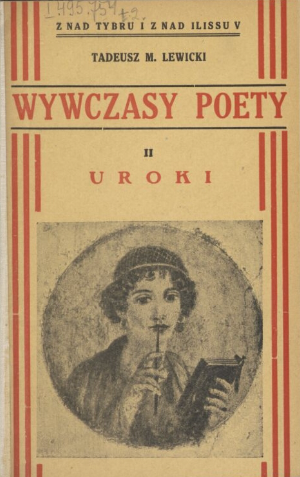Biblioteczka Filomaty
Biblioteczka Filomaty [The Little Library of "Filomata"] was a series of short monographs written by scholars for school children on various ancient themes (often biographies of ancient authors and figures, in the form of novellas or short stories) designed to inspire young people to study Antiquity. Most of the volumes were designated by the Ministry of Religious Affairs and Public Education as appropriate for children 11 to 13 years old. The series was initiated in 1934 by the editor of the quarterly Filomata (accessed: May 6, 2022) and published in Lwów (now Lviv) by the University Press. Publication of Biblioteczka Filomaty was restarted after WW2 and continued until 1965.
Filomata was published between 1929 and 1939 in Lwów and resumed in 1957–1996 in Kraków. The periodical, entitled after Greek φιλομαθία – “passion for knowledge”, was founded and edited by Ryszard Ganszyniec (changed in 1949 to Gansiniec) and after his death in 1958, for over 30 years by his wife Zofia Gansiniec, a classical philologist, ancient historian, and archaeologist. The editors stated that the first issue was aimed at high school students.* Inside, many papers were written by the most eminent scholars of the humanities. The profile of the periodical changed after the war, targeting university students and scholars; Filomata became focused on ancient culture and its reception: literature, language, history, and archaeology.
The series Biblioteczka Filomaty before 1939 contained:
- Lewicki, Tadeusz Marian, Z nad Tybru i z nad Ilissu:
- O triumfie rzymskim (accessed: May 6, 2022).
- W szkole atheńskiej (accesed: May 6, 2022).
- O widowiskach rzymskich (accessed: May 6, 2022).
- Rocznica urodzin w domu magnata rzymskiego (accessed: May 6, 2022).
- Rzymianin na ateńskiej akropoli
- Wysłannik króla Pyrrhosa w Rzymie
- Z dni klęsk i chwały (Salamina)
- Wywczasy poety (Horatius), part I, part II, part III, part IV (accessed: May 6, 2022).
- Bourget, Paul, Dobosz, trans. Oktawia Cybulska-Opolska.
- Krzemicka, Irena, Powrót Odyssa.
- Schulbaumówna, Zofia, Aspasia (accessed: May 6, 2022).
- Krzemicka, Irena, Pieśniarz życia, Hesiodos.
- Barbaszowa, Marja, Cornelia, matka Gracchów.
- Goldberger, Stanisław, Prawo rzymskie.
- Ganszyniec, Ryszard, Dzieje naszego abecadła.
- Schenkelbachówna, Halina, Agrippina, matka Nerona (accessed: May 6, 2022).
- Schulbaumówna, Zofia and Artur Rapaport, Xenophon. Żołnierz – historyk.
- Press, Izydor, Od alchemji do chemji.
- Sandauer, Artur, Theokritos, twórca sielanki.
- Sadowska, Stefanja, Diocletianus. Organizator państwa.
- Biliński, Bronisław, Hannibal, wódz karthagiński.
- Barbaszowa, Maria, Vestalka.
- Schulbaumówna, Zofia, Kleopatra.
- Pilch, Stanisław, Tacitus. Historyk cesarstwa (accessed: May 6, 2022).
- Krzemicka, Irena, O gród Ilionu.
- Czuprówna, Janina, Pindaros, piewca olympioników (accessed: May 6, 2022).
- Swieżawski, Stefan, Boëthius, ostatni Rzymianin.
- Stocka, Irena, Odkrycie Troi i świata Homera.
- Drzewiecki, Jerzy, Syn wyzwoleńca (accessed: May 6, 2022).
- Quintus Horatius Flaccus, Wybór poezji (accessed: May 6, 2022).
- Wąsowicz, Janina, Hippokrates i medycyna starożytna.
- Macaulay, Thomas Babington, Pieśni starorzymskie, trans. Paulina Klarfeldówna.
- Srebrny, Stefan, Co zawdzięczmy kulturze starożytnej.
- Kaczkowski, Stanisław, Na nutę Horacego (accessed: May 6, 2022).
- Hospodarewska, Joanna, Kuchnia starożytna.
- Dąmbska, Izydora, Platon.
- Ganszyniec, Ryszard, Metryka klasyczna.
- Lechicki, Czesław, M. Porcius Cato Starszy.
- Moraczewska, K, Bajka w starożytności.
- Ganszyniec, Ryszard, Wymowa łaciny.
The contents of the series are based on: Spis wydawnictw Filomaty oraz Spis rzeczy do Filomaty 1–83, Lwów: Administracja Filomaty, Lwów Uniwersytet, 1937, 23–24.
Available at: obc.opole.pl (accessed: May 6, 2022).
* Ryszard Ganszyniec, “List redaktora do filomaty”, Filomata 1 (1929): 46–48.
Prepared by Marta Pszczolińska, University of Warsaw, m.pszczolinska@al.uw.edu.pl
Records in database:



